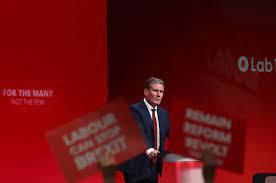Oh dear, this week’s annual Labour conference was meant to be the relaunch of Keir Starmer’s leadership. The fact he needs a relaunch in the first place so early in his role speaks volumes.
It has not worked and the voting public, much shrewder than many commentators give them credit for, have noticed. An opinion poll in yesterday’s (London) Evening Standard made bleak reading. Only 25% of respondents say Labour is ready to form a government and even fewer, at 20%, say the Party has a good team of leaders.
Starmer, one guesses, is a good man but not a political one. Botched shadow cabinet reshuffles, few defining policy initiatives and sub-standard, clumsy Blairite manoeuvres on his own party have all backfired.

Consequently, coverage of Labour’s activities in Brighton this week has not been kind to Starmer. Forced to dilute his amendments to leadership rules, he finally got through a requirement that you need 20% of Labour MPs to support a leadership bid, abolished the ability (incredible it existed in the first place!) to join the Labour Party on a one-off basis for a fee of £25 simply to vote in a leadership ballot and achieved tougher deselection thresholds for Labour MPs. All good stuff but executed without Blair’s finesse. It simply reminded voters this is a Party that talks to itself in a way the Tories would never do.
Then the awful Deputy Leader, Angela Rayner, calls the Tories ‘scum’ and the last Corbynite in the Shadow Cabinet, Andy McDonald, Shadow Employment Secretary, resigns mid-conference protesting at a lack of support for a £15 minimum wage which he possibly forgets would bankrupt many small businesses. It stole the thunder from an impressive speech by the Shadow Chancellor, Rachel Reeves. Just hopeless.
And why does all this matter? Because the state of British politics has never been weaker. Allegations of corruption and gross incompetence swirl around Johnson and many of his team. The country is now finding out just how damaging Brexit is as labour restrictions cause supply shortages from fresh food to petrol. We are only just struggling out of an often poorly managed pandemic response and the government has yet to be held to account for its actions. Only a nimble, effective Opposition can provide the scrutiny required to improve political discourse and this week the Labour Party has been found wanting…, yet again.
A new party, as argued before, is badly needed. In the meantime, we are left with Keir Starmer having to give a conference ‘speech of his life’ tomorrow to rescue his leadership and Labour’s already weak election chances. It shouldn’t be like this.

